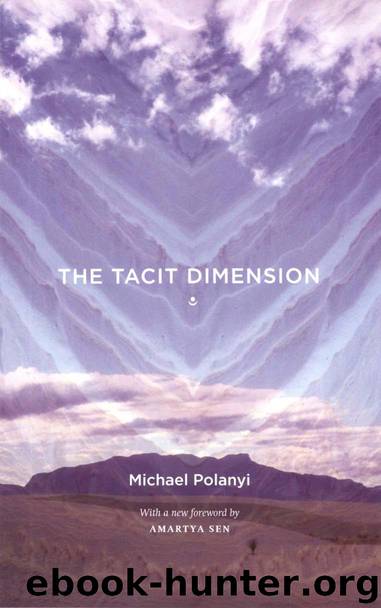The Tacit Dimension by Michael Polanyi & Amartya Sen

Author:Michael Polanyi & Amartya Sen [Polanyi, Michael & Sen, Amartya]
Language: eng
Format: epub
Tags: Philosophy, Science, [No data]
ISBN: 9780226672984
Google: zfsb-eZHPy0C
Amazon: 0226672980
Goodreads: 6379692
Publisher: The University of Chicago Press
Published: 1967-01-02T00:00:00+00:00
* Thus the usual chemical kinetics, based on mass action, is a more comprehensively statistical description of chemical change than would be the tracing of the causal chain giving rise to a single new molecule. The modern dynamics of chemical reactions (as studied by D. R. Herschbach, R. B. Bernstein, J. C. Polanyi, and others) is comprised altogether in this causal chain.
-3-
A SOCIETY OF EXPLORERS
My first lecture dealt with our power of tacit knowing. It showed that tacit knowing achieves comprehension by indwelling, and that all knowledge consists of or is rooted in such acts of comprehension. The second lecture showed how the structure of tacit knowing determines the structure of comprehensive entities. By studying the way tacit knowing comprehends human performances, we saw that what is comprehended has the same structure as the act that comprehends it. The relation of a comprehensive entity to its particulars was then seen to be the relation between two levels of reality, the higher one controlling the marginal conditions left indeterminate by the principles governing the lower one. Such levels were then stacked on top of each other to form a hierarchy, and this stacking opened up the panorama of stratified living beings. This stratification offered a framework for defining emergence as the action which produces the next higher level, first from the inanimate to the living and then from each biotic level to the one above it. This holds both for the development of an individual and for the evolution of living things.
Thus emergence took over from tacit knowing the function of producing fundamental innovations; but, as emergence continued to scale the heights leading on to the rise of man, it gradually resumed its encountered form of human knowing. So in the end we were confronted again with the mind of man, making ever new sense of the world by dwelling in its particulars with a view to their comprehension.
Now we enter a new range of subjects. We must ask whether intellectual powers, grounded in tacit knowing and descended from evolutionary emergence, can exercise the kind of responsible judgment which we must claim if we are to attribute a moral sense to man. Could, in fact, my rebuttal of exactitude as the ideal of science open the way toward a theory re-establishing the justification of moral standards?
Let me take my bearings once more from the questions which formed my point of departure. I told you how I was struck by the theory that prevailed for a considerable time under Stalin in Soviet Russia, which denied the justification of science as a pursuit of knowledge for its own sake. I said that this violent self-immolation of the mind was actuated by moral motives, and that a similar fusion of unprecedented critical lucidity and intensified moral passions pervades our whole civilization, inflaming or paralyzing both reason and morality.
The story has often been told how scientific rationalism has impaired moral beliefs, first by shattering their religious sanctions and then by questioning their logical grounds; but the usual account does not explain the state of the modern mind.
Download
This site does not store any files on its server. We only index and link to content provided by other sites. Please contact the content providers to delete copyright contents if any and email us, we'll remove relevant links or contents immediately.
Enlightenment Now: The Case for Reason, Science, Humanism, and Progress by Steven Pinker(7303)
A Journey Through Charms and Defence Against the Dark Arts (Harry Potter: A Journey Through…) by Pottermore Publishing(4796)
The Immortal Life of Henrietta Lacks by Rebecca Skloot(4571)
A Journey Through Divination and Astronomy by Publishing Pottermore(4376)
Elon Musk by Ashlee Vance(4118)
Origin Story: A Big History of Everything by David Christian(3679)
COSMOS by Carl Sagan(3617)
Alchemy and Alchemists by C. J. S. Thompson(3509)
Bad Pharma by Ben Goldacre(3419)
Enlightenment Now by Steven Pinker(3363)
Shadow of Night by Deborah Harkness(3353)
Inferior by Angela Saini(3310)
A Mind For Numbers: How to Excel at Math and Science (Even If You Flunked Algebra) by Barbara Oakley(3293)
Origin Story by David Christian(3192)
The Code Book by Simon Singh(3172)
Signature in the Cell: DNA and the Evidence for Intelligent Design by Stephen C. Meyer(3123)
The Elements by Theodore Gray(3050)
A Brief History of Time by Stephen Hawking(3017)
A Journey Through Potions and Herbology (A Journey Through…) by Pottermore Publishing(2843)
